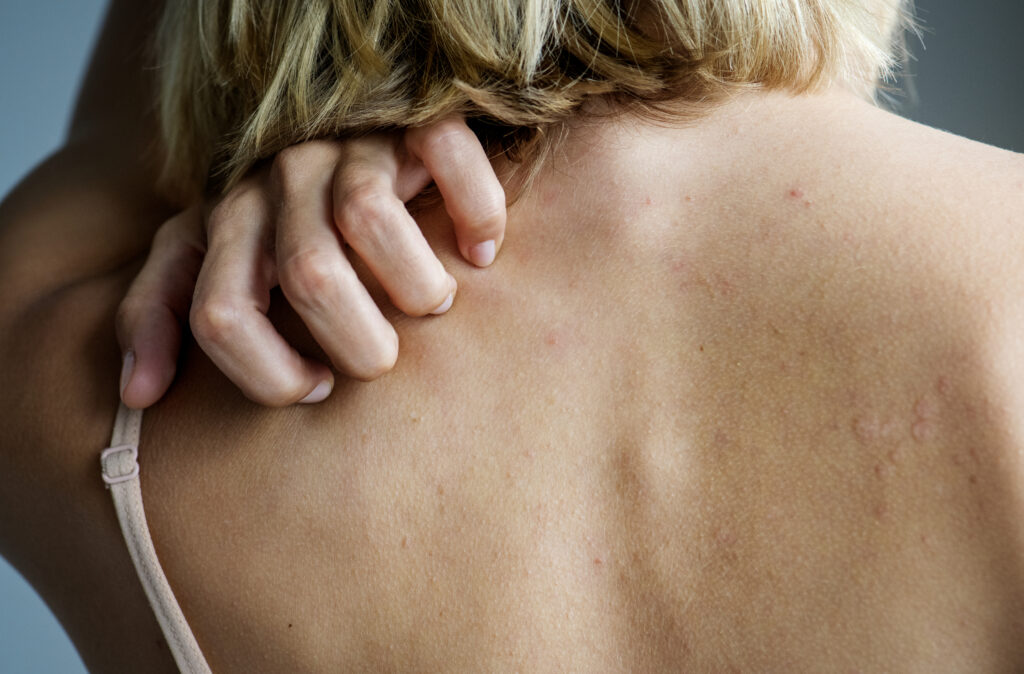Psoriasis
Psoriasis is a common autoimmune disease that affects the skin. It happens when the T cells attack healthy skin cells, causing them to be replaced too quickly. This leads to a build-up of too many cells, which creates a thick, inflamed layer of skin called ‘plaques’.
Psoriasis usually appears as thick, scaly patches on the skin that can be itchy and sore, usually appearing on the elbows, knees, and scalp (although it can appear anywhere on the body). It often comes and goes in waves, too – one month, a person might experience little-to-no symptoms, then the next, they may have a severe flare-up.
While there is no psoriasis cure, there are plenty of helpful ways to manage symptoms when they appear.
Types of Psoriasis
There are several different types of psoriasis – all of which affect a person differently. To understand what you are dealing with, you first need to understand what type of psoriasis you have.
Plaque Psoriasis
The most common type of psoriasis is plaque psoriasis, which affects up to 80 percent of sufferers. It produces raised, dry, red patches on the skin called lesions. Often, these patches are covered with what looks like silvery scales.
Some people may experience small lesions, whereas others can get large areas of it. It often affects the knees, elbows, lower back, and scalp.
Guttate Psoriasis
Guttate psoriasis affects children and young adults the most and looks like small, scaly red spots on the skin. It may cover a small patch of skin, or it might cover a large area, like a person’s back. In very severe cases, the lesions can cover over 10% of the body.
Nail Psoriasis
Nail psoriasis affects the nails, making the toenails or the fingernails change in appearance. The nails may get thicker, turn a different color, get ridges or grooves, or even separate from the nailbed.
Pustular Psoriasis
Pustular psoriasis is a rarer form of psoriasis that affects adults more than children. It is known for its small white bumps filled with pus, along with reddish blotches on the skin called pustules. These pustules often appear on the hands, soles of the feet, fingers, and toes. They can also be incredibly itchy and scaly, which can make a person’s day-to-day life difficult.
Inverse Psoriasis
Inverse psoriasis affects only particular areas of the body – specifically, where skin folds. That includes the breasts, buttocks, armpits, and groin. It forms red, shiny lesions in these areas, which often crack, causing immense discomfort.
Erythrodermic Psoriasis
Erythrodermic psoriasis is a rarer form of psoriasis. It can be particularly aggressive, too, causing rashes and peeling all over the body. Symptoms include burning, itching, blisters, and bright red skin. Sufferers may also encounter swelling. It is a severe type of psoriasis and requires medical professionals to help.
Psoriasis Symptoms
Psoriasis symptoms can range from mild to severe. The early signs of psoriasis are often more mild psoriasis symptoms, and they might appear as small, reddish patches, whereas severe psoriasis might produce large, thick, scaly skin that itches and cracks. here are the most common symptoms:
- Red, scaly patches on the skin (plaques)
- An itching and burning feeling
- Cracked skin
- Thick and/or ridged nails
- Stiff and swollen joints (particularly where there’s a flare-up)

What Causes Psoriasis?
There is no known cause for psoriasis. However, scientists and researchers have determined that the immune system plays a significant role. They also know that genetics influence whether a person gets psoriasis.
While there are no definite psoriasis causes, there are certain triggers that can cause a flare-up. Some of the most common psoriasis triggers are:
- Stress
- Injury
- Cold and dry weather
- Infections
- Alcohol
- Certain foods
- Too much sun exposure
Psoriasis Treatments
While there is no cure, there are plenty of excellent treatment options to help reduce symptoms and lead a more fulfilled life, whether you have psoriasis on your chest, nose, palms, or psoriasis under nails. During your visit to the doctor, they will examine your problem areas and most likely perform a biopsy to determine what type of psoriasis you have.
Once you know what kind of skin condition you have, you can start working out the best psoriasis treatment options.
Topical Treatments
Topical treatments are common for treating psoriasis, many producing excellent results. As complementary care to topical treatments, Decubal Original Clinic cream can help treat dryness and soften the skin. Keeping skin moisturized can help provide psoriasis itching relief and help the patches to heal. The product can be used on face and body, while Face Vital Cream is a good option to use in a moisturizing face routine.
There are plenty of excellent topical creams for psoriasis symptoms and gels you can purchase in-store. As a complementary product to help soothe the itch, Decubal anti-itch gel helps the feeling of psoriasis itching by calming skin through a cooling effect. The relief from this helps on the urge of scratching at the lesions, giving them the chance to heal.
Light Therapy
Some people experience great results with light therapy for psoriasis. It involves exposing the affected area to ultraviolet light in a controlled medical area. It often involves multiple sessions. For it to work, consistency is necessary.
Medications
Medication is also often used to treat psoriasis. There are different types of medications offered, including oral treatments, topical treatments, and injections.
Steroids, for example, can be given as an injection straight into the affected area. It helps reduce inflammation, which, in turn, will help minimise the other symptoms like itchiness. Your doctor can also prescribe oral treatments like Cyclosporine, Soriatane, Methotrexate, and Otezla.
Treatment for the Scalp
It can be a little more challenging to treat even mild scalp psoriasis due to the nature of the location. If you have a head full of hair, you can’t apply a cream in the same way you would with your arms or legs. The best treatment for the symptoms of psoriasis on the head is the Decubal Dry Scalp Treatment, as it nourishes and soothes the scalp while you’re in the shower. You can use it a few times a week to help minimise the scalp psoriasis symptoms like flakiness and itching.
Healing psoriasis involves plenty of trials and errors. It’s a battle, but many people find a treatment that works for them, allowing them to go about their lives without letting psoriasis get in the way.

Living with Psoriasis
Psoriasis is itchy, uncomfortable, and sometimes even painful, making day-to-day tasks harder. If you experience psoriasis on your hands, you might struggle to wash the dishes or use normal hand soap. If you get psoriasis on your hands and feet, and the plaque psoriasis (red, dry patches) becomes severe, these plaques may crack open and then bleed, resulting in you being unable to walk with ease.
Physical symptoms aren’t the only symptoms of psoriasis that sufferers have to handle. It can also cause self-esteem issues, leading to anxiety and depression. Some people may isolate themselves because of the impact that psoriasis has on their life.
Psoriasis does not have to take over, though. With the right treatments and therapies, you can live a fulfilled life where psoriasis doesn’t control your choices. Below are some ways to take back control:
Get Symptoms Under Control
Getting psoriasis symptoms under control is important. Otherwise, you may lose sleep, lack concentration, and find yourself in constant discomfort. Speak to a dermatologist about managing symptoms. Also, try some topical treatments to help soothe the dryness and itch such as Decubal Basic Original Clinic Cream or Decubal Itch Gel.
If you can notice the psoriasis early symptoms, you may be able to lessen the discomfort you experience.
Manage Stress
Stress is a known trigger of psoriasis flare-ups. The more stressed you are, the more likely you are to experience psoriasis. By getting your stress levels under control, you can also get your symptoms under control. Activities like working out, meditation, and spending time in nature are great for lowering stress levels and, in turn, psoriasis caused by stress.
Learn the Triggers
Knowing what triggers your psoriasis helps you prevent flare-ups from happening. Keep a diary and document what you have done in the run-up to a psoriasis outbreak. That might include the materials you’ve worn, what you have eaten, and how long you spent outside.
Wear Comfortable Clothing
When psoriasis flares up, you may experience dry, cracked, itchy skin that rubs against your clothing. Don’t make it worse by wearing something that makes it feel more itchy or uncomfortable. Instead, invest in loose-fitting clothing. That way, you can get on with your day with more ease. If you feel self-conscious about your psoriasis, you can also choose clothing and cover-ups that help minimise its appearance while you seek severe psoriasis treatment.
Join a Support Group
Many people with psoriasis feel alone, but that is not the case. Many people deal with psoriasis. In fact, you likely already know somebody who does. To help you manage mentally, consider joining a psoriasis support group. Voicing your inner worries and listening to other people’s stories will help you feel less alone. Speak to your doctor about support groups in your area.
Psoriasis FAQs
Can Psoriasis Go Away?
Psoriasis is a lifelong, chronic condition, which means there is no psoriasis cure. It can go away from time to time, though, as it often works in cycles. Plus, finding the right treatment can help you manage symptoms when flare-ups occur.
What’s the Best Treatment for Psoriasis?
There are plenty of medications, therapies, and creams for psoriasis. Different treatments work differently for everyone. Speak to a dermatologist if you need treatment for severe psoriasis. If you need something to help minimise drying and itching, the Decubal anti-itch gel works great.
Is Psoriasis Genetic?
Researchers have found a link between psoriasis and genetics. A child is more likely to develop psoriasis if their parent has the condition.
Can You Have Both Eczema and Psoriasis?
Yes – it is possible for a person to have psoriasis and eczema together. Each condition requires its own treatment.
Does Psoriasis Increase the Likelihood of Getting Arthritis?
A study has found that adults with psoriasis are more likely to get rheumatoid arthritis than those without. It’s important to note that having psoriasis can put you at a higher risk of other conditions, such as obesity, type 2 diabetes, arthritis, and mental health conditions.
Is Psoriasis Contagious?
No – psoriasis is not contagious. No one can spread psoriasis to another person.
Links & Sources
- https://www.psoriasis.org/locations-and-types/
- https://www.webmd.com/skin-problems-and-treatments/psoriasis/ss/slideshow-home-remedies-for-psoriasis
- https://www.healthline.com/health/psoriasis/is-psoriasis-hereditary
- https://www.everydayhealth.com/psoriasis/living-with/psoriasis-and-other-autoimmune-diseases-their-connection-your-risk/#:~:text=Indeed%2C%20a%20study%20published%20in,compared%20to%20adults%20without%20psoriasis.
No products found